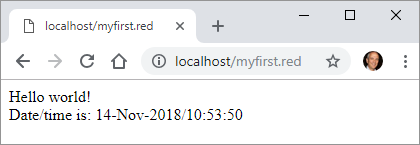CGI using Red
Hello World!
See also: Using Red as CGI
Make a copy of the Red interpreter and save that executable to the www folder of your Cheyenne, just like you did to Rebol.
Rename Red's executable to something like redcgi.exe. I found that to be important because I have Red already "installed" in my computer (where my server is running - localhost), and the operating system tries to just run the script, not "CGI it".
Open the httpd.cfg file in a plain text editor, and add .red to the "bind-extern CGI to" block, as shown:
globals [
;--- define alternative and/or multiple listen ports (by default, cheyenne will run on 80)
;listen [80 10443]
bind SSI to [.shtml .shtm]
bind php-fcgi to [.php .php3 .php4]
bind-extern CGI to [.cgi .red]
bind-extern RSP to [.j .rsp .r]
Now create the following script in a plain text editor and save it as myfirst.red in the same www folder. --cli is important, otherwise Red may try to compile and open the GUI console.
#!www/redcgi.exe --cli
Red []
print "Hello world!"
print "<br/>"
print ["Date/time is:" now]
Now if your server is running (port 80) and you type localhost/myfirst.red in your browser's address bar, you get:

Processing web forms.
As mentioned, Red does not have yet full support for CGI. However, I believe it's possible to retrieve and decode HTTP messages in Linux, using Boleslav Březovský's http-tools.red . I don't know how to do that in Windows.